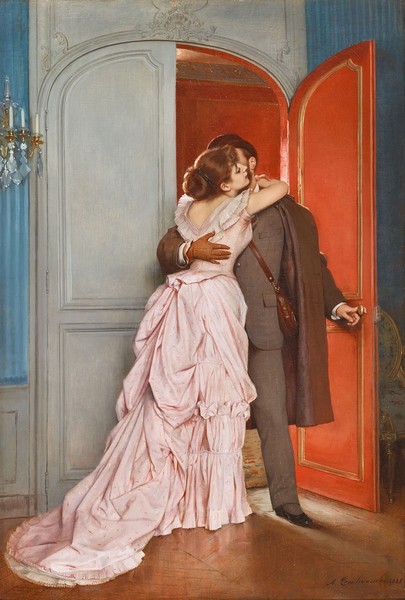
Songs that leave me unmoved. That I wouldn't add to a list of songs I don't like (a list which, in public, has a single item), but I wouldn't say I like them either. Songs that arouse mixed feelings when included in a recital programme, and I know that the feelings will turn into positive or negative depending on the day. That's to say: it will depend on me, on the artist, on the place it takes during the concert... It's an interesting experiment I do relatively often, because the four or five songs I keep in mind are among the best known of their authors.
I know what causes that uneasiness: too much sugar. I don't have much of a sweet tooth, and, for instance, many deserts that people love are too sickly sweet for me. In fact, I don't usually order dessert at a restaurant. And the thing is that I find those songs too sweet.
"Which songs are you talking about? We want examples!" That's what you're thinking, aren't you? Because I am aware that "too much sugar" is a relative concept. So let's go, here you are: Es muss ein Wunderbares sein, by Franz Liszt, one of his well-known lieder nowadays and in his time. He composed it in 1852, when he was the hofkapellmeister (the musical director at the court) of great duke Karl Friedrich of Saxe-Weimar-Eisenach, a great patron of the arts. Liszt had arrived at Weimar in 1848, and at the time he wrote this song he was mainly focused on conducting and composing his symphonic poems. But princess Augusta, the great duke's sister, suggested that he write it, and he could hardly refuse.
The verses belonged to Amaranth, a lyrical epic poem by Oskar von Redwitz which achieved a huge success when it was published in 1849; just to get an idea, it reached in 1851 the eighth edition. The poem talks about idealized Middle Ages, involving legends, religion and courtly love. The main character is the pious knight Walther (a name that refers to Walther von der Vogelweide, the greatest Minnesänger), who, in his way to Italia, stays in the castle of a noble whose daughter, Amaranth, falls in love with him. But, alas, Walther is engaged and is travelling to meet his fiancée Ghismonda, so Amaranth suffers in silence. When the knight meets Ghismonda, he discovers that the maiden doesn't believe in God, but instead has pantheistic feelings. Walther tries that she returns to faith, but he doesn't get it, so his only painful option is to break off their engagement. Back home, it stops again at the castle, and this time everything runs smoothly and Amaranth and Walther get married. Maybe you're thinking it's not a very exciting story; I think so too, but also think that Amaranth has many points in common with Tannhäuser, an opera (composed in 1845) that moves me every time I see it.
Redwitz's poem is divided into four cycles, each one divided into numerous chapters; we find the verses of Es muss ein Wunderbares sein towards the end of the second cycle, Amaranth; they are the first two stanzas of the chapter Amaranths stille Lieder (The quiet songs of Amaranth), where the young girl sings to an impossible love at the time. As I said, Liszt wrote it at Princess Alexandra's request, it's said that between lunchtime and dinner. Many years later, the composer gave this song as an example of what should be a song: a simple vocal line and a very simple accompaniment, which hardly underlines a few words. In those last years of his life, he revised many of his lieder to simplify them (I spoke here about that, in connection with the Tre sonetti di Petrarca); when he composed Es muss ein Wunderbares sein he already wrote an ideal song according to the criteria that would guide him thirty years later.
I know it's a beautiful song, no wonder it's so well known. But it's sweet, too sweet for my liking, and it remains in a kind of limbo of songs, between the "I like it" and the "I don't like it". Until a few months ago, I heard the version I'm sharing today, that of Jonas Kaufmann and Helmut Deutsch, and I surprised me when I stopped the player to play it again because I loved it. What was different this time? After giving some thought to the matter, I came to the conclusion that Kaufmann has a special connection with this kind of song, as well as other singers connect with contemplative or narrative pieces, and he often gets them to sound natural; I also think that Deutsch is a counterpoint, the pinch of salt that you add when baking to enhance tastes (but not sweetness). At least that's my feeling when I listen to their performance of Es muss ein Wunderbares sein.
Songs that leave me unmoved, that's how I began this article. Do you have songs that you like and don't like? Would you share them with us?
Es muss ein Wunderbares sein
Ums Lieben zweier Seelen,
Sich schliessen ganz einander ein,
Sich nie ein Wort verhehlen,
Und Freud und Leid und Glück und Not
So mit einander tragen;
Vom ersten Kuss bis in den Tod
Sich nur von Liebe sagen.
It must be a wonderful thing
for two souls to be in love,
locking each other in so completely,
never concealing a word;
and joy and grief, and happiness and hardship -
enduring these with each other
from the first kiss until death,
speaking together only with love.
(translation by Emily Ezust)

















Comments powered by CComment